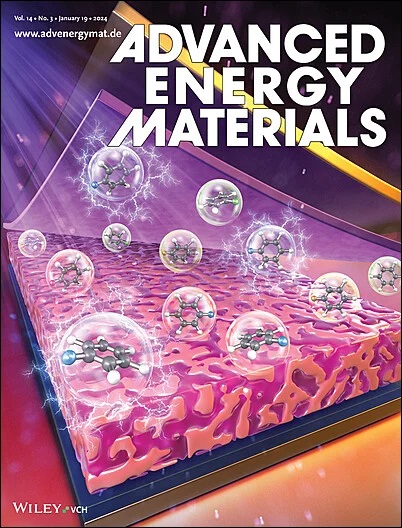Beyond Mechanics: Inherently HF‐Phobic Si with Minimized Corrosion for Stable Li Storage
IF 24.4
1区 材料科学
Q1 CHEMISTRY, PHYSICAL
引用次数: 0
Abstract
High‐capacity silicon (Si) anodes remain challenged by cycling stability and calendar life, despite extensive research on mechanical stabilization, mainly due to poorly understood and unresolved chemical corrosion (particularly involving HF) and its complex interactions. Herein, we propose a thermodynamically HF‐phobic strategy by infiltrating trace magnesium (Mg) into Si microparticles to obtain inherently corrosion‐resistant Si (ICR‐Si) with lower HF adsorption energy and a more positive Gibbs free energy of reaction with HF. This fundamentally suppresses the reactivity of Si with HF, interrupting the chain hydrolysis‐corrosion processes and minimizing the corrosion of Si itself and solid electrolyte interphases. We reveal a coupling effect between chemical corrosion and electrochemically mechanical cracking. ICR‐Si achieves remarkably mitigated particle fracture. Accordingly, superior intermittent cycling stability with extended rest periods and high‐temperature cycling over 500 cycles at 45 °C are achieved without additional protection. This work offers a paradigm shift toward better anodes by addressing chemical corrosion beyond mechanical failure.超越力学:具有最小化腐蚀的固有疏HF硅,用于稳定的锂储存
尽管对机械稳定性进行了广泛的研究,但高容量硅(Si)阳极在循环稳定性和日历寿命方面仍然面临挑战,这主要是由于对化学腐蚀(特别是HF)及其复杂的相互作用知之甚少和尚未解决。在此,我们提出了一种热阻HF策略,通过将微量镁(Mg)渗透到Si微粒中,获得具有较低HF吸附能和与HF反应的正吉布斯自由能的固有耐腐蚀Si (ICR‐Si)。这从根本上抑制了Si与HF的反应性,中断了链水解-腐蚀过程,最大限度地减少了Si本身和固体电解质界面相的腐蚀。我们揭示了化学腐蚀与电化学机械开裂之间的耦合效应。ICR‐Si可显著减轻颗粒断裂。因此,在没有额外保护的情况下,具有延长休息时间和超过500个45°C高温循环的优越间歇性循环稳定性。这项工作通过解决机械故障以外的化学腐蚀问题,为更好的阳极提供了一种范式转变。
本文章由计算机程序翻译,如有差异,请以英文原文为准。
求助全文
约1分钟内获得全文
求助全文
来源期刊

Advanced Energy Materials
CHEMISTRY, PHYSICAL-ENERGY & FUELS
CiteScore
41.90
自引率
4.00%
发文量
889
审稿时长
1.4 months
期刊介绍:
Established in 2011, Advanced Energy Materials is an international, interdisciplinary, English-language journal that focuses on materials used in energy harvesting, conversion, and storage. It is regarded as a top-quality journal alongside Advanced Materials, Advanced Functional Materials, and Small.
With a 2022 Impact Factor of 27.8, Advanced Energy Materials is considered a prime source for the best energy-related research. The journal covers a wide range of topics in energy-related research, including organic and inorganic photovoltaics, batteries and supercapacitors, fuel cells, hydrogen generation and storage, thermoelectrics, water splitting and photocatalysis, solar fuels and thermosolar power, magnetocalorics, and piezoelectronics.
The readership of Advanced Energy Materials includes materials scientists, chemists, physicists, and engineers in both academia and industry. The journal is indexed in various databases and collections, such as Advanced Technologies & Aerospace Database, FIZ Karlsruhe, INSPEC (IET), Science Citation Index Expanded, Technology Collection, and Web of Science, among others.
 求助内容:
求助内容: 应助结果提醒方式:
应助结果提醒方式:


